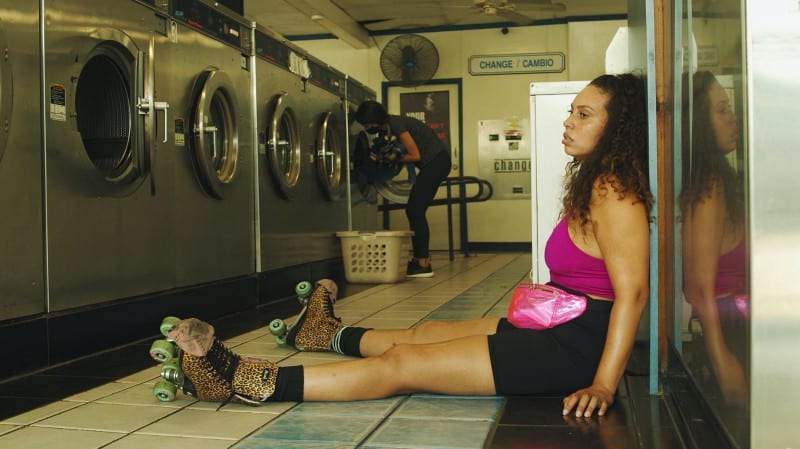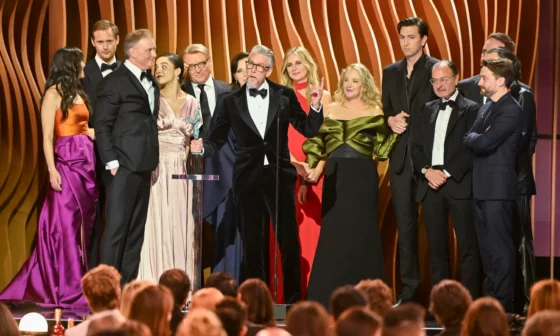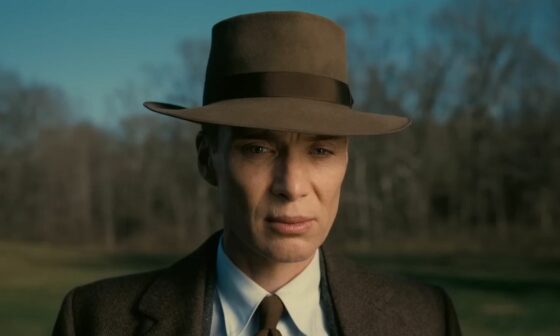
There aren’t many movies where the audience follows a roller-skating protagonist for 90 minutes, but that’s exactly what Kelley Kali and Angelique Molina‘s I’m Fine (Thanks For Asking) offers. But what sounds like a breezy frolic through sunny California is also a engrossing drama about a single mother working paycheque-to-paycheque to stay afloat.
The film revolves around Danny, a hairdresser who was recently widowed by the loss of her husband. His death has put her in an unenviable financial position, leading to her and her eight-year-old daughter Wes currently being houseless and living in a tent. Danny shields the truth from Wes by telling her it’s a camping trip, but while she keeps a brave face on, their situation is precarious.
The film focuses on one day in Danny’s life as she’s on the precipice of turning it around. She drops Wes off at a friend’s house and proceeds to skate around town to make the rounds hairdressing, hoping to scrape together enough cash for a deposit on an apartment.
But getting enough money for the deposit is nowhere near as smooth as she is on wheels. One client shorts her on the payment when she’s merely $200 away from enough cash, forcing her to jump into the gig economy and make deliveries for a local food delivery app. That leads to her running into some impatient clients, but also some old acquaintances.
Danny, played by Kali, is a likeable, energetic protagonist easy to empathise with since she’s in a financial position many watching will no doubt find familiar. Throw in the fact that the film is one of the rare new releases to not only be filmed since the COVID-19 pandemic began, but embrace our new reality by frequently having characters wear masks, and a lot here hits home.
That familiarity is only strengthened by the fact that this is a film about the hidden things parents have to go through to provide for their children. It’s no surprise that Wes is barely in the film and is a beaming child when on screen. To her, this is the breezy time the film’s aesthetic, bouncy original songs by Woo & The Clouds, and bright, colourful vibe implies.
But that bright aesthetic is juxtaposed against the rawness of Danny’s reality. Her struggles may be kept out of Wes’ view, but they are revealed to us, the adults that understand the immense work Danny is having to go through just to have a roof over her head.
So the film has built-in stakes, and Danny’s lack of security and against-the-clock dash for funds makes it frequently compelling. Like her, the audience will agonise over whether to sell her late husband’s ring for a nice sum, and bemoan the old friend slowing her quest down while trying to get romantically involved with her.
It’s a little like a looser, American version of the Dardenne brother’s Two Days, One Night. In that film, Marion Cotillard has to go around town convincing her co-workers to forego their bonuses so she can keep her job. Danny’s predicament is similar, and both films highlight the precariousness of working life in the 21st century.
Cotillard has to fight against rampant capitalism in more ways than one – especially the lack of protection for workers and the neoliberal idea that wealth is human progress – to keep her job, while Danny has to skate across town to scratch together everything she can to afford what should be a basic human right – a place to live.
The only two missteps the film makes is with one tonally out of place scene involving Danny confronting a man stealing from her tent, which leads to a random act of violence that doesn’t feel in sync with the rest of the film, and strangely isn’t even particularly relevant to the story.
The other is a cameo from comedian Deon Cole, who produced the film. The scene, like the one mentioned above, doesn’t move the plot along and feels more like an excuse to get the most famous name involved in the project on screen.
While these scenes do match up with the loose randomness of the film, neither of them are necessary. While they don’t take up too much time, and the film doesn’t suffer too much from their inclusion, cutting them would likely have meant a tighter, slightly more focused experience.
But Kali and Molina, as well as their co-screenwriter Roma Kong, deserve credit for creating a down-to-earth comedy-drama that’s happy to exist as it is. It never feels the pressure to create inauthentic scenarios in the quest for more jokes, nor does it feel the need to get overly sentimental to prove itself as a drama.
Outside of the one random scene sure to give the audience tonal whiplash, the film balances its tones well and feels gives a fresh perspective to a universal story. It’s the kind of film that could easily find a snug home on a streaming service like Netflix, where viewers would come for the laid back California sun, but stay for the human story at the center.
I’m Fine (Thanks For Asking) is currently showing at SXSW Online until Saturday.
#Peace.Love.ImFineThanksForAsking








